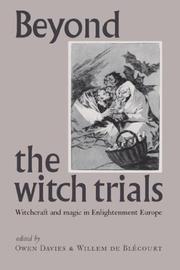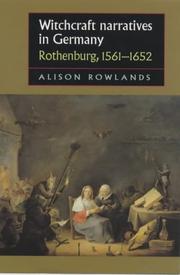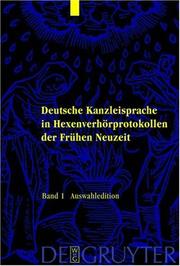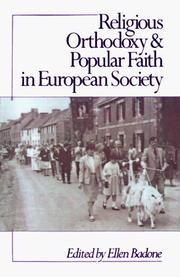| Listing 1 - 9 of 9 |
Sort by
|
Book
Abstract | Keywords | Export | Availability | Bookmark
 Loading...
Loading...Choose an application
- Reference Manager
- EndNote
- RefWorks (Direct export to RefWorks)
This book critiques historians' assumptions about witch-hunting as well as their explanations for this complex and perplexing phenomenon. The authors insist on the centrality of gender, tradition and ideas about witches in the construction of the witch as a dangerous figure. They challenge the marginalisation of male witches by feminist and other historians. The book shows that large numbers of men were accused of witchcraft in their own right, in some regions, more men were accused than women. The authors analyse ideas about witches and witch prosecution as gendered artefacts of patriarchal societies under which both women and men suffered. They challenge recent arguments and current orthodoxies by applying crucial insights from feminist scholarship on gender to a selection of statistical arguments, social-historical explanations, traditional feminist history and primary sources, including trial records and demonological literature. The authors assessment of current orthodoxies concerning the causes and origins of witch-hunting will be of particular interest to scholars and students in undergraduate and graduate courses in early modern history, religion, culture, gender studies and methodology.
Witchcraft --- Warlocks --- History. --- literature --- gender --- witchcraft --- Demonology --- Early modern Europe --- Early modern period --- Torture --- Witch-hunt
Book
Abstract | Keywords | Export | Availability | Bookmark
 Loading...
Loading...Choose an application
- Reference Manager
- EndNote
- RefWorks (Direct export to RefWorks)
This book critiques historians' assumptions about witch-hunting as well as their explanations for this complex and perplexing phenomenon. The authors insist on the centrality of gender, tradition and ideas about witches in the construction of the witch as a dangerous figure. They challenge the marginalisation of male witches by feminist and other historians. The book shows that large numbers of men were accused of witchcraft in their own right, in some regions, more men were accused than women. The authors analyse ideas about witches and witch prosecution as gendered artefacts of patriarchal societies under which both women and men suffered. They challenge recent arguments and current orthodoxies by applying crucial insights from feminist scholarship on gender to a selection of statistical arguments, social-historical explanations, traditional feminist history and primary sources, including trial records and demonological literature. The authors assessment of current orthodoxies concerning the causes and origins of witch-hunting will be of particular interest to scholars and students in undergraduate and graduate courses in early modern history, religion, culture, gender studies and methodology.
Witchcraft --- Warlocks --- History. --- literature --- gender --- witchcraft --- Demonology --- Early modern Europe --- Early modern period --- Torture --- Witch-hunt
Book
Abstract | Keywords | Export | Availability | Bookmark
 Loading...
Loading...Choose an application
- Reference Manager
- EndNote
- RefWorks (Direct export to RefWorks)
This book critiques historians' assumptions about witch-hunting as well as their explanations for this complex and perplexing phenomenon. The authors insist on the centrality of gender, tradition and ideas about witches in the construction of the witch as a dangerous figure. They challenge the marginalisation of male witches by feminist and other historians. The book shows that large numbers of men were accused of witchcraft in their own right, in some regions, more men were accused than women. The authors analyse ideas about witches and witch prosecution as gendered artefacts of patriarchal societies under which both women and men suffered. They challenge recent arguments and current orthodoxies by applying crucial insights from feminist scholarship on gender to a selection of statistical arguments, social-historical explanations, traditional feminist history and primary sources, including trial records and demonological literature. The authors assessment of current orthodoxies concerning the causes and origins of witch-hunting will be of particular interest to scholars and students in undergraduate and graduate courses in early modern history, religion, culture, gender studies and methodology.
Witchcraft --- Warlocks --- literature --- gender --- witchcraft --- Demonology --- Early modern Europe --- Early modern period --- Torture --- Witch-hunt --- History. --- History. --- literature --- gender --- witchcraft --- Demonology --- Early modern Europe --- Early modern period --- Torture --- Witch-hunt

ISBN: 0719066603 9786610734580 1280734582 184779100X 1526137267 Year: 2004 Publisher: Manchester ; New York : New York : Manchester University Press ; Distributed in the USA by Palgrave,
Abstract | Keywords | Export | Availability | Bookmark
 Loading...
Loading...Choose an application
- Reference Manager
- EndNote
- RefWorks (Direct export to RefWorks)
Beyond the witch trials provides an important collection of essays on the nature of witchcraft and magic in European society during the Enlightenment. The book is innovative not only because it pushes forward the study of witchcraft into the eighteenth century, but because it provides the reader with a challenging variety of different approaches and sources of information. The essays, which cover England, Netherlands, Spain, Italy, Germany, Scotland, Finland and Sweden, examine the experience of and attitudes towards witchcraft from both above and below. While they demonstrate the continued widespread fear of witches amongst the masses, they also provide a corrective to the notion that intellectual society lost interest in the question of witchcraft. While witchcraft prosecutions were comparatively rare by the mid-eighteenth century, the intellectual debate did no disappear; it either became more private or refocused on such issues as possession. The contributors come from different academic disciplines, and by borrowing from literary theory, archaeology and folklore they move beyond the usual historical perspectives and sources. They emphasise the importance of studying such themes as the aftermath of witch trials, the continued role of cunning-folk in society, and the nature of the witchcraft discourse in different social contexts. This book will be essential reading for those interested in the decline of the European witch trials and the continued importance of witchcraft and magic during the Enlightenment. More generally it will appeal to those with a lively interest in the cultural history of the late seventeenth and eighteenth centuries. This is the first of a two-volume set of books looking at the phenomenon of witchcraft, magic and the occult in Europe since the seventeenth century.
Esoteric sciences --- History of civilization --- History of Europe --- anno 1700-1799 --- Enlightenment --- Witchcraft --- History --- Black art (Witchcraft) --- Sorcery --- Occultism --- Wicca --- enlightenment --- folklore --- witchcraft --- Superstition --- Witch-hunt --- Literature and literary studies. --- Literary studies: general. --- Biography, Literature & Literary Studies --- Literature: history & criticism.

ISBN: 1781700168 128073387X 9786610733873 1847790240 1417576375 9781526137982 9781781700167 9781847790248 9781417576371 6610733872 1526137984 0719052599 9780719052590 9781280733871 184779520X 9781847795205 Year: 2003 Publisher: Manchester, UK ; New York : New York : Manchester University Press ; Distributed exclusively in the USA by Palgrave,
Abstract | Keywords | Export | Availability | Bookmark
 Loading...
Loading...Choose an application
- Reference Manager
- EndNote
- RefWorks (Direct export to RefWorks)
This text looks at why witch-trials failed to escalate into ""witch-crazes"" in certain parts of early modern Europe. Using the legal records of Rothenburg ob der Tauber, the book explores the social and psychological conflicts behind the making of accusations and confessions of witchcraft.
Witchcraft --- History --- Black art (Witchcraft) --- Sorcery --- Occultism --- Wicca --- 291.33 --- Directe invloed op de goddelijke wil: hekserij; bezweringen; magie, toverij --- 291.33 Directe invloed op de goddelijke wil: hekserij; bezweringen; magie, toverij --- germany --- folklore --- witchcraft --- witches --- Defamation --- Early modern period --- Lutheranism --- Torture --- Wettringen (Münsterland) --- Witch trials in the early modern period --- Witch-hunt --- Würth --- History. --- European history. --- HISTORY / Europe / Germany. --- History & Archaeology


ISBN: 1283396726 9786613396723 3110201569 311018091X 9783110201567 9783110180916 Year: 2008 Publisher: Berlin ; Boston : De Gruyter,
Abstract | Keywords | Export | Availability | Bookmark
 Loading...
Loading...Choose an application
- Reference Manager
- EndNote
- RefWorks (Direct export to RefWorks)
Das Werk bietet auf der Grundlage von Hexenverhörprotokollen der Zeit 1580-1650 eine regional differenzierte Dokumentation der frühneuzeitlichen Kanzleisprache. Die hier erstmals edierten 56 Protokolle entstammen deutschen Archiven; sie sind in diplomatischer Form zugänglich gemacht, damit ein vergleichender Überblick möglich wird. Da die Verhöre den gemeinsamen Nenner ,Hexereiverfolgung' und somit ähnliche Strukturen aufweisen, liegt mit diesem sprachhistorischen Korpus ein Materialfundus vor, der verschiedenen Forschungsinteressen dienen kann. Er wirft Fragen nach formalen und textstrukturellen Merkmalen, dem Verhältnis von Mündlichkeit und Schriftlichkeit, den regionalen Spezifika der jeweiligen Kanzleisprache, den kulturellen und konfessionellen Unterschieden sowie nach der Pragmatik der frühneuzeitlichen Rechtskommunikation auf. Das Werk besteht aus drei Teilen, die durch den Leitaspekt ,Sprache' verbunden sind. Band 1 enthält die Edition autopsierter Original-Protokolle. Band 2 enthält eine Bibliographie. Die beigegebene CD-ROM ergänzt diese Texte um weitere, anderen Editionen entnommene Protokolle, so dass insgesamt gegen 100 Quellen greifbar werden. Das Werk ist durch das Ausmaß des präsentierten Materials und durch dessen Erschließung (Erläuterungstexte, kommentierende Fußnoten, Wort- und Sachregister) für die Sprachgeschichte, aber auch für die Rechts- und Kulturgeschichte von großer Bedeutung. Mit ihm werden Grundlagen bereitgestellt, die nicht zuletzt für eine interdisziplinäre Kooperation von hohem Nutzen sein können.
Historische Linguistik. --- Law. --- Trials (Witchcraft). --- Law - Non-U.S. --- Law, Politics & Government --- Law - Europe, except U.K. --- Trials (Witchcraft) --- Law --- German language --- History --- Language. --- History. --- Ashkenazic German language --- Hochdeutsch --- Judaeo-German language (German) --- Judendeutsch language --- Judeo-German language (German) --- Jüdisch-Deutsch language --- Jüdischdeutsch language --- Acts, Legislative --- Enactments, Legislative --- Laws (Statutes) --- Legislative acts --- Legislative enactments --- Germanic languages --- Jurisprudence --- Legislation --- Witchcraft --- official language. --- witch trials. --- witch-hunt. --- SORCELLERIE --- HISTOIRE --- ALLEMAGNE --- 16E-17E SIECLES --- PROCES --- EDITION CRITIQUE

ISBN: 9789047420552 9047420551 9789004160934 9004160930 9786611936204 1281936200 Year: 2007 Volume: 124 Publisher: Leiden Brill
Abstract | Keywords | Export | Availability | Bookmark
 Loading...
Loading...Choose an application
- Reference Manager
- EndNote
- RefWorks (Direct export to RefWorks)
Recent witchcraft historiography, particularly where it concerns the gender of the witch-suspect, has been dominated by theories of social conflict in which ordinary people colluded in the persecution of the witch sect. The reconstruction of the Eichstätt persecutions (1590-1631) in this book shows that many witchcraft episodes were imposed exclusively ‘from above’ as part of a programme of Catholic reform. The high proportion of female suspects in these cases resulted from the persecutors’ demonology and their interrogation procedures. The confession narratives forced from the suspects reveal a socially integrated, if gendered, community rather than one in crisis. The book is a reminder that an overemphasis on one interpretation cannot adequately account for the many contexts in which witchcraft episodes occurred.
Sex role --- Trials (Witchcraft) --- Witchcraft --- 133.4 --- 133.4 Occulte werking. Magie. Toverij --- Occulte werking. Magie. Toverij --- Black art (Witchcraft) --- Sorcery --- Occultism --- Wicca --- Religious aspects --- History --- Germany --- Alemania --- Ashkenaz --- BRD --- Bu̇gd Naĭramdakh German Uls --- Bundesrepublik Deutschland --- Deutsches Reich --- Deutschland --- Doitsu --- Doitsu Renpō Kyōwakoku --- Federal Republic of Germany --- Federalʹna Respublika Nimechchyny --- FRN --- German Uls --- Germania --- Germanii︠a︡ --- Germanyah --- Gjermani --- Grossdeutsches Reich --- Jirmānīya --- KhBNGU --- Kholboony Bu̇gd Naĭramdakh German Uls --- Nimechchyna --- Repoblika Federalin'i Alemana --- República de Alemania --- República Federal de Alemania --- Republika Federal Alemmana --- Vācijā --- Veĭmarskai︠a︡ Respublika --- Weimar Republic --- Weimarer Republik --- ХБНГУ --- Германия --- جرمانيا --- ドイツ --- ドイツ連邦共和国 --- ドイツ レンポウ キョウワコク --- Germany (East) --- Germany (Territory under Allied occupation, 1945-1955) --- Germany (Territory under Allied occupation, 1945-1955 : British Zone) --- Germany (Territory under Allied occupation, 1945-1955 : French Zone) --- Germany (Territory under Allied occupation, 1945-1955 : Russian Zone) --- Germany (Territory under Allied occupation, 1945-1955 : U.S. Zone) --- Germany (West) --- Holy Roman Empire --- Social conditions --- Religious aspects. --- Deguo --- 德国 --- Gėrman --- Герман Улс --- Witchcraft - Germany - Eichstatt (Landkreis) - History - 16th century. --- Witchcraft - Germany - Eichstatt (Landkreis) - History - 17th century. --- Trials (Witchcraft) - Germany - Eichstatt (Landkreis) - 16th century. --- Trials (Witchcraft) - Germany - Eichstatt (Landkreis) - 17th century. --- Sex role - Religious aspects. --- Early Modern History --- Eichstätt --- Interrogation --- Witch-hunt

ISBN: 0691094500 069122501X Year: 1990 Publisher: Princeton : Princeton University Press,
Abstract | Keywords | Export | Availability | Bookmark
 Loading...
Loading...Choose an application
- Reference Manager
- EndNote
- RefWorks (Direct export to RefWorks)
By examining the ongoing tension between popular and official religion in Europe, this collection of essays contributes significantly to the continuing effort to understand the religious experience of ordinary people. Ranging from the Mediterranean to northern Europe and including both Roman Catholic and Eastern Orthodox traditions, the ethnographic contexts evoked in these essays enable us to see people actively and creatively shaping their religious domain, sometimes in collaboration with official ritual specialists, often in open rebellion against them. The use of folklore texts and extensive narrative "ations, combined with an approach highlighting key symbols such as pilgrimages and festas, provides a common theoretical orientation throughout the bookone that considers how religious discourses are formed by social disciplines and relationships of power and subordination. This volume includes "Spirits and the Spirit of Capitalism" by Jane Schneider, "The Priest and His People: The Contractual Basis for Religious Practice in Rural Portugal" by Caroline B. Brettell, "The Struggle for the Church: Popular Anticlericalism and Religiosity in Post-Franco Spain" by Ruth Behar, "Pilgrimage and Popular Religion at a Greek Holy Shrine" by Jill Dubisch, "Breton Folklore of Anticlericalism" by Ellen Badone, "Stories of Power, Powerful Stories: The Drunken Priest in Donegal" by Lawrence J. Taylor, and "Reflections on the Study of Religious Orthodoxy and Popular Faith in Europe" by Stanley Brandes.
Europe --- Religious life and customs --- Christianity --- Religion --- 20th century --- Religió --- Cristianisme --- Europa. --- Europa --- Vida social i costums --- Vida religiosa. --- Vida social i costums. --- African religion. --- Ancestor worship. --- Asturias, religious beliefs in. --- Belief systems. --- Benedictine Order. --- Bruxo priests. --- Cathars. --- Commensal customs, reciprocity and. --- Delumeau, Jean. --- Deng, Francis Mading. --- Dias, Jorge. --- Disenchantment. --- Dominican Order. --- Doxa. --- Eastern Orthodox Church. --- Edict of Nantes (1685). --- Evil. --- Fires of Saint John. --- Folk religion, defined. --- Foster, George. --- Gender and religion. --- Ginzburg, Carlo. --- Gypsies. --- Hauschild, Thomas. --- Henningsen, Gustav. --- Inquisition. --- Integrist movement. --- Islam. --- Jansenism. --- Jesuits. --- Judaism. --- Klaniczay, Gabor. --- Le Goff, Jacques. --- Levi, Giovanni. --- Liberation theology. --- Luther, Martin. --- Memorates. --- Mendicant orders. --- National Catholicism. --- Normandy, magic in. --- Pentecostalists. --- Pilgrimage. --- Redfield, Robert. --- Saint Anthony, cult of. --- Saint processions. --- Secularization. --- Tylor, Edward B. (Sir). --- Unamuno, Miguel de. --- Vows. --- Waldensians. --- Weber, Max. --- Witch-hunt, as religious reform. --- Agnosticisme --- Animisme --- Apoteosi --- Ascetisme --- Aspectes religiosos --- Associacions religioses --- Ateisme --- Catequesi --- Creença i dubte --- Escepticisme --- Fetitxisme --- Fonamentalisme religiós --- Litúrgia --- Misteris religiosos --- Mite --- Monoteisme --- Moviments nativistes --- Objectes religiosos --- Psicologia de la religió --- Psicologia i religió --- Sagrat --- Sobrenatural --- Vida religiosa --- Déu --- Filosofia de la religió --- Irreligiositat --- Pensament religiós --- Religions --- Estats i territoris --- Euràsia --- Alps --- Camí de Sant Jaume --- Corredor Mediterrani --- Danubi (Europa : Curs d'aigua) --- Europa central --- Europa de l'Est --- Europa del Nord --- Europa del Sud --- Europa occidental --- Països de la Unió Europea --- Rin (Europa : Curs d'aigua) --- Roine (Europa : Curs d'aigua) --- Tràcia (Regió històrica)
Book
ISBN: 0691186979 Year: 2018 Publisher: Princeton, NJ : Princeton University Press,
Abstract | Keywords | Export | Availability | Bookmark
 Loading...
Loading...Choose an application
- Reference Manager
- EndNote
- RefWorks (Direct export to RefWorks)
In the 1980s, America was gripped by widespread panics about Satanic cults. Conspiracy theories abounded about groups who were allegedly abusing children in day-care centers, impregnating girls for infant sacrifice, brainwashing adults, and even controlling the highest levels of government. As historian of religions David Frankfurter listened to these sinister theories, it occurred to him how strikingly similar they were to those that swept parts of the early Christian world, early modern Europe, and postcolonial Africa. He began to investigate the social and psychological patterns that give rise to these myths. Thus was born Evil Incarnate, a riveting analysis of the mythology of evilconspiracy. The first work to provide an in-depth analysis of the topic, the book uses anthropology, the history of religion, sociology, and psychoanalytic theory, to answer the questions "What causes people collectively to envision evil and seek to exterminate it?" and "Why does the representation of evil recur in such typical patterns?" Frankfurter guides the reader through such diverse subjects as witch-hunting, the origins of demonology, cannibalism, and the rumors of Jewish ritual murder, demonstrating how societies have long expanded upon their fears of such atrocities to address a collective anxiety. Thus, he maintains, panics over modern-day infant sacrifice are really not so different from rumors about early Christians engaging in infant feasts during the second and third centuries in Rome. In Evil Incarnate, Frankfurter deepens historical awareness that stories of Satanic atrocities are both inventions of the mind and perennial phenomena, not authentic criminal events. True evil, as he so artfully demonstrates, is not something organized and corrupting, but rather a social construction that inspires people to brutal acts in the name of moral order.
Good and evil --- Ritual abuse --- Conspiracies --- Demonology --- Public opinion --- History. --- Public opinion --- History. --- Public opinion --- History. --- Public opinion --- History. --- Alien abduction. --- Angel Heart. --- Angra Mainyu. --- Anton LaVey. --- Apocalyptic literature. --- Apologetics. --- Armor of God. --- Backbiting. --- Blasphemy. --- Blood libel. --- Cannibalism. --- Cataclysm (Dragonlance). --- Catharism. --- Child abuse. --- Child sacrifice. --- Child sexual abuse. --- Christian fundamentalism. --- Compendium Maleficarum. --- Conspiracy theory. --- Counterculture. --- Crime. --- Daeva. --- Deal with the Devil. --- Debbie Nathan. --- Demon. --- Demonic possession. --- Demonology. --- Devourer. --- Disgust. --- Dismemberment. --- Ethnic violence. --- European witchcraft. --- Evocation. --- Exorcism. --- Expurgation. --- Falsity. --- Familiar spirit. --- Gluttony. --- God. --- Heresy. --- Incest taboo. --- Incest. --- Indication (medicine). --- Individual terror. --- Infanticide. --- Jacob Frank. --- Judensau. --- Maleficent. --- Malleus Maleficarum. --- Manichaeism. --- Martha Corey. --- Mass hysteria. --- Matthew Hopkins. --- Michael Langone. --- Michelle Remembers. --- Mind control. --- Murder. --- Necrophilia. --- Obscenity. --- Onoskelis. --- Orgy. --- Parody. --- Perversion. --- Pierre de Lancre. --- Pornography. --- Posttraumatic stress disorder. --- Promiscuity. --- Proscription. --- Psychoanalysis. --- Psychotherapy. --- Rape culture. --- Religion. --- Rite. --- Robert Calef. --- Sacrilege. --- Salem witch trials. --- Satanic ritual abuse. --- Satanism. --- Sexual inversion (sexology). --- Sexual violence. --- Social criticism. --- Spiritual warfare. --- Spitting. --- Superiority (short story). --- Supreme crime. --- Tanya Luhrmann. --- Theistic Satanism. --- This Present Darkness. --- Torture chamber. --- Torture. --- Totem and Taboo. --- Traditional witchcraft. --- Trickster. --- Ventriloquism. --- Violence and the Sacred. --- War. --- Warfare. --- Witch trials in the early modern period. --- Witch-hunt. --- Witchcraft.
| Listing 1 - 9 of 9 |
Sort by
|

 Search
Search Feedback
Feedback About UniCat
About UniCat  Help
Help News
News